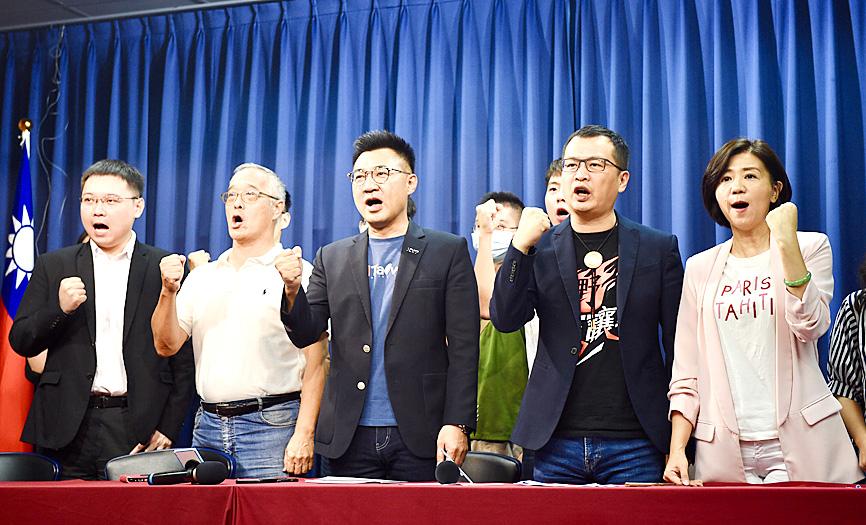Chinese Nationalist Party (KMT) Chairman Johnny Chiang (江啟臣) yesterday initiated a proposal for a referendum calling for referendum voting to be held concurrently with national elections, with the aim of “returning power to the people.”
The Democratic Progressive Party (DPP) has used its legislative majority to rule aggressively since coming to power in 2016 and prevented members of the public from expressing themselves on issues, Chiang told a news conference in Taipei.
“This situation demonstrates the importance of direct democracy,” he said.

Photo: Peter Lo, Taipei Times
The outcomes of the 2018 referendum votes were not what the DPP had hoped for, so it decoupled referendums from presidential elections, changing the law so that referendum voting would only be held every two years, he said.
The DPP on June 17 last year amended the Referendum Act (公民投票法) so that referendum voting would be held every two years — but not on years when presidential elections are held — on the fourth Saturday of August.
“[The DPP] turned the ‘birdcage referendum’ into an ‘iron cage referendum.’ It has turned its back on all that it strove to achieve over more than 30 years, and has harmed people’s rights,” he said.
Referendum voting is a constitutionally protected right of Taiwanese and a way for people to directly exercise their rights, but restricting when referendum voting can occur restricts when people can exercise this right, he said.
Police reports of breaches of the Social Order Maintenance Act (社會秩序維護法) have increased over the past few years, Chiang said, citing an example of an issue that might be of public concern.
In 2018, there were 21 cases, but last year, there were 151 cases and in the first five months of this year, there were 233 cases — but only a 25 percent conviction rate, he added.
“Is Taiwan becoming a police state?” he asked.
The value of democracy is the ability to question the government and a democratic government has a responsibility to respond to the public, not bring charges against them, he said.
“Otherwise, what has changed since the White Terror era of the past?” Chiang asked.
In the face of this threat, Chiang said that he felt compelled to propose a referendum calling for referendum voting to be held alongside presidential elections.
Holding referendum voting separately costs taxpayers about NT$850 million (US$28.8 million), but when held together, as in 2018, referendum voting only cost NT$145 million, he said.
“This is not just a KMT issue — it concerns all Taiwanese nationwide,” KMT Institute of Revolutionary Practice director Lo Chih-chiang (羅智強) said.
“The public must not sit idly by and watch as the DPP turns the nation into a one-party state,” Lo said, adding that the KMT would keep the DPP in check starting at the grassroots level.
If Chiang’s referendum is successful, referendum voting could be tied to by-elections as soon as 2022 and presidential elections as soon as 2024, Lo added.

The manufacture of the remaining 28 M1A2T Abrams tanks Taiwan purchased from the US has recently been completed, and they are expected to be delivered within the next one to two months, a source said yesterday. The Ministry of National Defense is arranging cargo ships to transport the tanks to Taiwan as soon as possible, said the source, who is familiar with the matter. The estimated arrival time ranges from late this month to early next month, the source said. The 28 Abrams tanks make up the third and final batch of a total of 108 tanks, valued at about NT$40.5 billion

Travel agencies in Taiwan are working to secure alternative flights for travelers bound for New Zealand for the Lunar New Year holiday, as Air New Zealand workers are set to strike next week. The airline said that it has confirmed that the planned industrial action by its international wide-body cabin crew would go ahead on Thursday and Friday next week. While the Auckland-based carrier pledged to take reasonable measures to mitigate the impact of the workers’ strike, an Air New Zealand flight arriving at Taipei from Auckland on Thursday and another flight departing from Taipei for Auckland on Saturday would have to

A group from the Taiwanese Designers in Australia association yesterday represented Taiwan at the Midsumma Pride March in Melbourne. The march, held in the St. Kilda suburb, is the city’s largest LGBTQIA+ parade and the flagship event of the annual Midsumma Festival. It attracted more than 45,000 spectators who supported the 400 groups and 10,000 marchers that participated this year, the association said. Taiwanese Designers said they organized a team to march for Taiwan this year, joining politicians, government agencies, professionals and community organizations in showing support for LGBTQIA+ people and diverse communities. As the first country in Asia to legalize same-sex

MOTIVES QUESTIONED The PLA considers Xi’s policies toward Taiwan to be driven by personal considerations rather than military assessment, the Epoch Times reports Chinese President Xi Jinping’s (習近平) latest purge of the Chinese People’s Liberation Army (PLA) leadership might have been prompted by the military’s opposition to plans of invading Taiwan, the Epoch Times said. The Chinese military opposes waging war against Taiwan by a large consensus, putting it at odds with Xi’s vision, the Falun Gong-affiliated daily said in a report on Thursday, citing anonymous sources with insight into the PLA’s inner workings. The opposition is not the opinion of a few generals, but a widely shared view among the PLA cadre, the Epoch Times cited them as saying. “Chinese forces know full well that